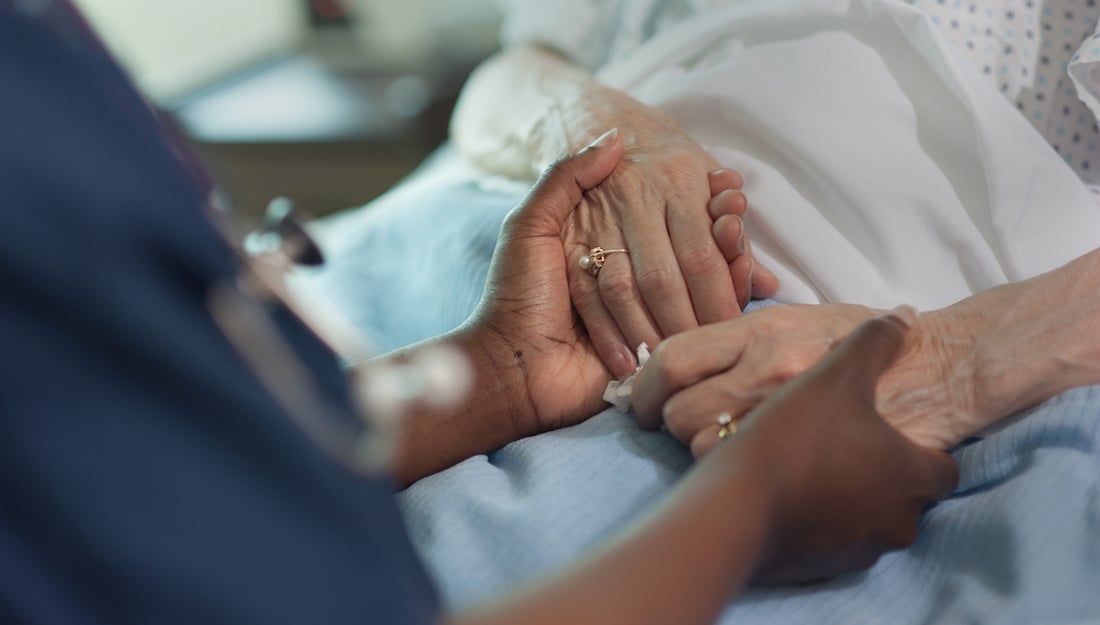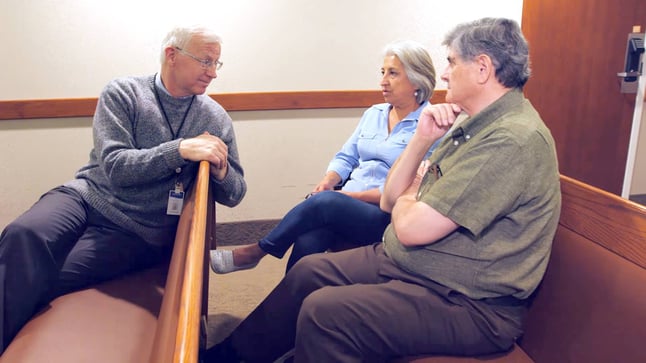
What is the most important part of the end-of-life care process? Compassion. The National Institute on Aging states that older adults need care in four main areas:physical comfort, mental and emotional needs, spiritual needs, and everyday tasks. At Gulfside Healthcare Services, our team addresses each of these care areas. Our team believes that end-of-life care doesn't only mean attentive medical care for the patient, but additional steps and proper care with family members or loved ones.
Addressing these four main areas for patients in Pasco County is what Gulfside aims to do every day. In this blog you will be able to learn more about the different advocates and members of the care team that will assist you, or a loved one, during the end-of-life process.

Providing Compassionate Care for The Aging Body.
Aches and pains come with aging.Luckily there are numerous different services that can increase the mobility and longevity of the body - one of those services being home health care. The home health care team is made up of many therapists that can provide various services to help ease the pain that comes along with aging. The goal of home health care is to address the physical and functional dimensions of a patient's suffering to create a care plan that can make life at home easier.
For example, a physical therapist that specializes in home health care might help a patient find new exercises to do at home to ensure that their quality of life is not worsening after a diagnosis or surgery. The best part about home health care is it can occur alongside another care plan which means that your primary care physician and home health aide can work together to ensure that you, or a loved one, have a smooth recovery. Home Health care doesn't have to begin at the time of a diagnosis or injury either. Specialists that work in this care service can also assist older adults that are suffering with ailments like arthritis get some relief from daily aches and pains so they can continue to live their life to the fullest.
Other Home Health Therapies & Services Include:
- Balance training to prevent fails
- Wound Care
- Medication management injections
- Diabetic management and education
- Speech therapy
- Other skilled nursing services
How Palliative Care Can Help Mend The Body:
Palliative care is defined as - medical care for people diagnosed with a chronic condition, such as cancer, dementia, liver disease, Alzheimer's, and more. The goal of palliative care is to improve the quality of life for patients and remove some of the stress from caregivers.
This type of health care is meant to enhance the quality of life and get a patient back on their feet. Palliative care teams can assist patients, which results in fewer hospital visits. This means more time at home and less cost for the patient and family. In addition to reduced hospital visits, Gulfside is currently accepting telehealth Palliative Care appointments.
Palliative Care Services include:
- Identify program eligibility and coordinate services for home care and equipment, Hospice, Medicaid, Medicare, VA benefits and other community resources
- Provide expertise in pain and symptom management. Offer emotional and spiritual support to patients and families.
- Consultation with medical and nursing staff on how to begin the conversation with your loved one about palliative care.
- Provide individualized care and resources for coping with denial, depression, loss and grief.
Providing Compassionate Care for the Mind & Soul:
Just like the body aches as we age, so does the mind. It is important that compassionate care is provided to this part of the body as well. As time goes on, diseases like Alzheimer’s can make it more difficult to remember things, communicate effectively and do everyday activities like swallowing or walking. According to the Alzheimer’s Association in 2021, the likelihood that an adult in the United States would be diagnosed with this disease increased by 12%. The Alzheimer’s Association also reports that currently more than six million adults are living with this brain disease in the United States and many of these individual’s do not have access to affordable healthcare.
It is important to remember that Alzheimer’s is not the only brain disease or disorder that comes with old age. If you have ever overhead a conversation about Alzheimer’s, you have probably heard the word “dementia” mentioned. Dementia is sometimes a result of a person living with Alzheimer’s for an extended period, but Dementia also has other causes such as:
- Parkinson’s Disease
- Mixed Pathologies
- Hippocampal sclerosis
- Cerebrovascular disease
- Lewy body disease
- Frontotemporal lobar degeneration (FTLD)
At Gulfside, the Comfort Connections program aims to alleviate symptoms of these types of diseases and bring comfort by offering specialized care for patients with these diagnoses, and by connecting patients with chaplains, volunteers, veterans, and staff that specialize in different fields. For example, the veterans program pair’s patients that have served in the military with volunteers that have also served time in the military, because our team recognizes that veterans need specialized care during the end-of-life process.

Comfort Connections also has other services like the Pet Peace of Mind program that takes care of a companion’s needs during the hospice process and assists with rehoming them when the time comes. There are many other programs at Gulfside that can assist with memory, mobility, and make spirituality accessible no matter where care takes place.
Providing Compassionate Care For The Family:
Gulfside strives to not only offer compassionate care for the patient, but for their families and caregivers as well. Families can receive support, request services, or voice their concerns to social workers and counselors at the care facilities or call the caregiver support line anytime. Bereavement Services offers numerous support groups and workshops throughout the year for caregivers and anyone in the community dealing with loss and grief.
Caregiver Support Services can help family members that are becoming first-time caregivers make sure they are caring for themselves too, and manage side effects of the end-of-life process, like caregiver burnout or compassion fatigue. Compassion Fatigue is a side effect of caring for somebody in need, and not giving yourself a break and time to heal stress. It often leads to an individual having a tough time empathizing with the person they are taking care of, and sometimes even resentment towards them for the new situation in which they find themselves.
You can learn more about Gulfside’s Bereavement and Caregiver Support Services here.
How To Begin Receiving Compassionate Care at Gulfside.
Compassionate care at Gulfside aims to address ailments physically, mentally, and emotionally, as well as spiritually. The care teams, specialists, and programs at Gulfside that aim to cater to the needs, desires, and hopes of everybody involved in the end-of-life process.
If you feel like you or your loved one may be in need of care, our team is here to help. Learn more about the care and services available here, or complete our online Referral Form HERE at any time to request a consultation with a member of the Gulfside team to learn more.
Related Posts
How To Begin The Conversation About Hospice
There are various tools, strategies, and resources can help first-time family caregivers begin the...
Telehealth: Making Palliative Care Accessible For Those With Chronic Illness
With the advancement of technology, tasks like visiting the doctor, going to therapy, and being...
How To Start The Hospice Process
Hospice. An intimidating word to hear at first, and one that leads to a new chapter life. If you...



